Having both a baby and a dog in the same living environment might sound like fun, but the truth is that babies and dogs may not always get along. So, what happens when you witness a dog biting baby? That can be a tricky thing to navigate. Join us as we explore the reasons dogs bite babies, what you can do about it, and how to prevent it.
What If My Dog Bites My Baby?
If your dog bites your baby, the first thing you’ll want to do is to immediately separate the two of them.
Treat any wounds that may have been inflicted, and calm your baby if he or she is crying. In extreme scenarios, take your child to the ER or call an ambulance.
If the bite isn’t severe, simply clean any open wounds and place clean bandages on them.
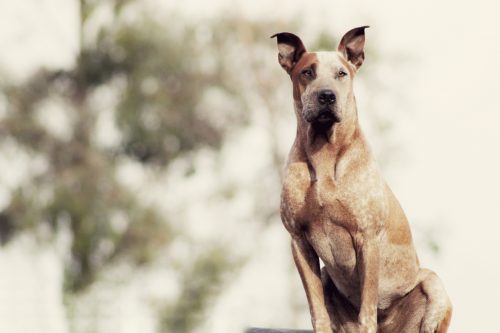
After you’ve taken care of your baby, it is time to assess the situation. You need to know what inspired your dog to bite your baby and how it can be prevented in the future.
A few questions may help you navigate the situation such as:
- What was happening just before the bite?
- Was the dog in a fearful or threatening situation?
- Were there food or toys involved?
- Was there rough play involved?
- What is the size of the dog?
- Was the baby screaming, crawling, walking before the bite?
- Have there been similar incidents that have happened before?
- How did the dog react after the bite?
- Were there adults present before the bite took place?
All of these questions and more can help guide you in drawing a few conclusions about the circumstances surrounding the dog bite and why it happened.
Sometimes, it could be that your dog has a low threshold for stress. In this case, your dog may need to be seen by a trainer and may need time away from the baby. Depending on the scenario, training can happen at home and can be accomplished by a professional. Still, when reintroducing the dog to the baby after the dog has bitten or shown aggression, it is imperative that visits with the child be short, brief, spread out over time, or nothing at all. More on how best to navigate decisions following a bite later.
How Do I Stop My Dog From Biting My Baby?
The best way to keep your dog from biting your baby is to take preventative action before this scenario ever takes place.
First and foremost, you should never leave your baby alone with your dog, even if he or she is well-trained. Babies and toddlers can get into mischief, and they are unable to read cues from dogs. Thus, growling, snarling, or any type of warning signs that your dog might exhibit may not be interpreted the same by a child as it would an adult. Thus, it is imperative that you are present for any interactions your dog has with your baby.
Next, you’ll want to be deliberate about introducing your baby to your dog in a safe and effective way. One great way to do this is by slowly acclimating your baby and your dog over an extended period of time. This is often referred to as “desensitization”.
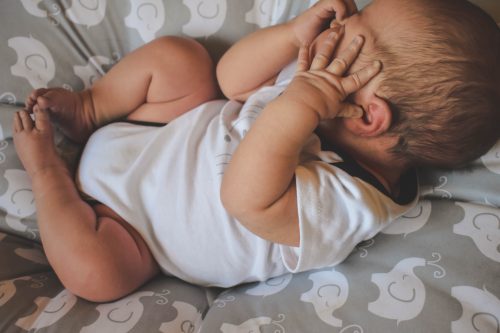
During the desensitization period, you will expose your dog to your child for a short amount of time, preferably at a distance. Over time, you can allow your dog closer to the child. But if he or she displays signs of aggression, you’ll want to back away. Once desensitization training phases end, put your dog in an area separate from the baby until your baby and dog have become fully acclimated.
You may also consider muzzling your dog while he or she is around the baby (still supervised of course) until the dog becomes better acclimated.
How to Keep Dog From Biting Baby
After acclimating your dog and your baby, you will need to keep a close watch on your baby’s activities and actions around your dog. Because babies and toddlers tend to scream, cry, laugh loudly, rough-house, pull dog tails and ears, and play with dog food and water, it may be that though your dog is usually well-behaved, he or she may suddenly feel threatened by your child and may feel the need to defend themselves, or their possessions.
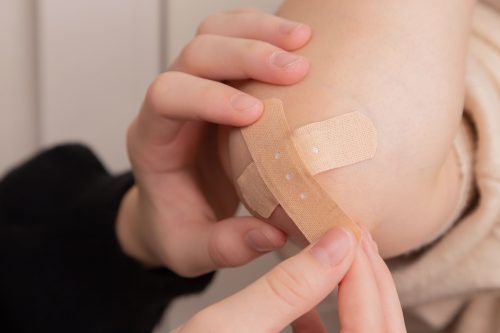
Because of this, you’ll want to manage not only your pup but your baby as well. Certain behaviors should be off-limits for your child when he or she is around your dog.
These behaviors include:
- Bothering a dog while he or she is eating or drinking
- Taking away a dog’s toy or bone
- Backing a dog into a corner
- Jumping on or falling on a dog
- Screaming in a dog’s face
- Pull-on a dog’s tails or ears
What to Do With Your Dog If It Bites Your Child?
If your dog bites your child, you as the parent will have a few decisions to make.
First, you’ll want to consider the context of the situation. What was the reason for the bite? Was the dog provoked to bite? If the dog wasn’t provoked, what was going on at the time? Were any adults present?
You’ll also want to consider the severity of the bite. Was the bite very severe or was it just a nip that didn’t break the skin?
The answers to these questions will vary, but one thing is for certain. It will be up to you to determine the next steps you should take. For some, this may mean supervising every interaction your dog has with your child. And if your child has been previously bitten by the dog, then this course of action is a must.
However, it may be that in some cases your actions to remediate this problem may need to go beyond simply supervising the subsequent interactions between your dog and child.
If your dog has bitten your child in a way that caused severe injury, you may need to consider giving your dog away or having him or her euthanized. Though this is typically the least desired outcome, you need to consider the safety of your child, first and foremost.
What to Do If Your Dog Bites Your Child
If your dog bites your child, separate the two immediately. Place the dog in an area where he or she no longer has access to your baby. Then, treat your child’s wounds.
If your baby or toddler is bleeding profusely, you’ll want to seek medical treatment immediately. Also, if your child’s immune system is compromised, or if your child has sustained injuries to the neck, hands, face, or feet, you may need to speak with a medical professional. Dogs carry a lot of bacteria in their mouths which can lead to illness for your child. In some cases, your child may require stitches.
Should a Dog Be Put Down For Biting a Child?
In some situations, the answer is yes… but it also depends.
If the dog was provoked in some way, then it is possible that the dog was simply defending him or herself. Having said that, in the case of a dog biting a child unprovoked, especially if the bite was severe and/or broke skin, then euthanasia should definitely be considered a possibility.
Your other options? You could wait it out and see if you can retrain the dog not to bite your baby again. The problem with this approach, however, is that if your dog does bite again, there is no guarantee that the bite won’t be worse the second – or third, or fourth – time around. Thus, you are essentially endangering your child by keeping them around a pet that is already showing aggressive behaviors towards your child.
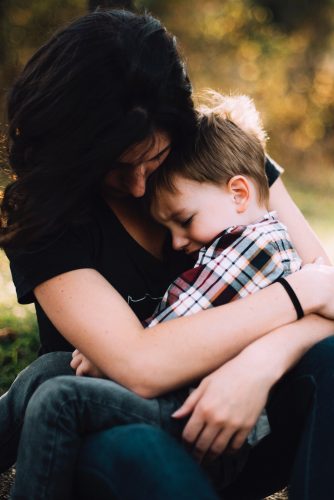
Yet another option is to re-home the dog. Some owners aren’t comfortable with this idea because it means sending the dog to live in a home where he or she could potentially end up biting someone else (baby or adult).
Ultimately, the decision to wait it out, euthanize the dog or rehome the dog is up to you. However, we urge you to take a close look at the context of the situation and the severity of the bite. Consider both before making your final decision.
Never keep a pet around your baby that has the potential to seriously injure him or her in any way!
Dog Suddenly Aggressive Towards Child
Always keep a close eye out for warning signs that your dog is showing signs of aggression. When you see this aggressive behavior in your dog, be sure to separate your dog from your baby. But also, try determine why it is happening.
A dog that is suddenly aggressive may be showing signs of illness or injury. Moreover, the dog may be possessive, showing dominance, or may even be showing fear.
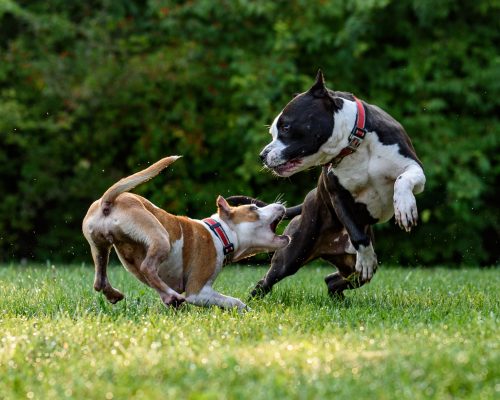
No matter the cause, you should ensure the child’s safety over all else. As you explore the reasons why your dog is showing aggression, keep your dog and child separate for the time being.
Bear in mind that dogs can often find babies and children frightening, threatening, and foreign. So if you are introducing a new dog to your home, or you are introducing a baby to your dog, you should expect that your dog may not take it as well as you’d like. Take the process slowly, and never leave your baby alone with your dog.
Dog Nipping at Baby
Babies do a lot of things that keep their parents and those around them laughing. Whether it be pulling earrings and jewelry or poking their tiny fingers in the ears, most adults understand that these are simply the kinds of behaviors that babies engage in.
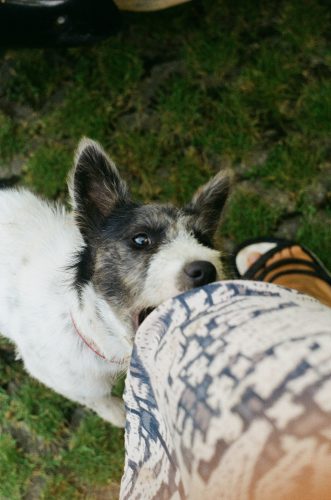
Dogs, however, do not interpret the actions of babies and small children this way. A baby or small child that is provoking the dog by pulling its ears, tail, or going after its food may nip at a baby as a warning. When you see this, it is important that you intervene in whatever way keeps your child safe.
Remember, if your dog draws blood, this is a sign that you may have tough decisions to make ahead of you. While training your dog is an option, the importance of keeping your child safe cannot be understated.
How to Discourage Dog From Biting Baby
How to Discourage Older Dog From Biting Baby
The best way to discourage a dog of any age from biting your baby is prevention. Prevent your baby from provoking your dog. Socialize your pup with your baby slowly and over time through desensitization to help with this.
Some sources also recommend that you offer your dog a treat whenever the baby is around. And if you can, bond with your dog while simultaneously caring for your baby. This way, your dog will begin to associate the baby with rewards.
Remember that once your dog starts biting your baby, it may already be too late. Take the right precautions ahead of time. Strongly reconsider if you are planning to bring a new dog into the home when you have babies or toddlers in the home.
A Dog Biting a Baby Is Serious Business
Remember that although we know you love your pup, your child’s safety is very important. To prevent bites ahead of time, be sure you have a well-scripted plan of how you will introduce your baby to your dog. Build a positive level of interaction between both the dog and your child.
On top of training your dog, be sure to train your child about correct and incorrect ways to handle a dog. Never allow your child to engage in disrespectful or threatening behavior around your dog. And never allow your baby or toddler around your dog unsupervised. It only takes one second for an incident to happen that can change the course of the lives of everyone involved.
More about baby safety on the blog:

Leave a Reply